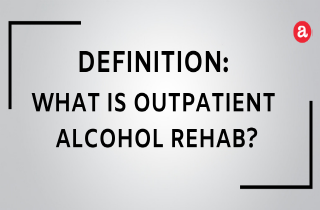Q: What is outpatient alcohol rehab?
A: Outpatient rehabs are registered clinics that provide non-residential treatment for drinking problems during which you attend daily or weekly therapy sessions for 3-20 hours per week.
More here on the definition of alcohol rehabs, with a section for your questions at the end.
Outpatient alcohol rehab definition
Outpatient alcohol rehab is a form of addiction treatment that includes psychological, counseling, and educational sessions on the nature of alcoholism. Who is outpatient rehab treatment is designed for? Individuals who can benefit most from outpatient rehab have been diagnosed with alcohol dependence or abuse AND who are able to comply with treatment outside a 24-hour treatment setting.
Clients participate in outpatient alcohol rehab for a certain amount of time per day or for a certain number of days per week while seeking treatment for alcohol abuse. Outpatient alcohol rehab provides services for medical detox, counseling, and aftercare referrals in order to provide patients with the best chance at maintaining long term sobriety.
Outpatient alcohol rehab goals
There are several goals that outpatient alcohol rehab facilities will aim to achieve while you are participating in the program. Of these goals, the most important is recovery from alcohol abuse, which normally takes the form of total abstinence from drinking. During alcohol rehab you will learn how to cope with life and how to get through difficulties without using alcohol.
Here is a list of some of the other goals of outpatient alcohol rehabs:
- end alcohol abuse
- establish positive support system
- improve general health
- improve personal circumstances
- meet employment and educational needs
- reduce criminal behavior and resolve legal problems
- treat psychiatric disorders and psychological problems
It is the aim of outpatient alcohol rehab programs to give you the best chance at success for long-term sobriety. Meeting these goals is the beginning of getting your life on track for long-term sobriety. But what does the recovery process look like and what can you expect during outpatient rehab for alcoholism?
What happens during outpatient alcohol rehab?
1. Physical and psychological assessment
When entering an outpatient rehab, you will first go through a process of intake and assessment. During this phase, facility staff usually ask that you take an initial drug test, medical exam, and you will participate in an interview process with a licensed psychologist or medical psychiatrist. During this initial intake phase, outpatient rehab staff will establish a treatment plan personalized for you based on your individual circumstances.
2. Medical detox for alcohol
Alcohol withdrawal begins 3-5 hours after you discontinue use of alcohol. You will probably NOT go through detox at the outpatient clinic itself. If necessary, you will next go through withdrawal from alcohol, sometimes in a detox clinic that is recommended by the outpatient clinic. In extreme cases, medication may be necessary in order to detox safely. Nonetheless, all detox for alcohol withdrawal should be medically supervised.
3. Therapy
Therapy is the most important aspect of outpatient alcohol rehab. Outpatient alcohol rehab includes a range of treatment protocols, from highly professional psychotherapy to informal peer discussions. Counseling services vary considerably and include individual, group, or family counseling; peer group support; vocational therapy; marital therapy; and cognitive therapy.
This stage of alcoholism treatment will require you to be present at the rehab facility several days a week. This stage begins to assess psychological damage and treat psychosocial problems in order to build a base for long-term sobriety.
4. Education
Understanding more about alcoholism increases motivation and commitment to treatment. Outpatient alcohol rehabs include an educational component on models and theories of addiction in order to help problem drinking:
- Cope with high-risk situations
- Find the motivation to stop drinking
- Identify and use positive support networks
- Identify cues or triggers to alcohol use: people, places, and things
- Know the stages of recovery
- Learn about the bio-psychosocial disease model
- Learn about alcoholism recovery processes
- Learn about early and protracted alcohol withdrawal symptoms
- Learn strategies for quitting drinking
- Structure personal time
- Understand alcohol cravings and urges and how to cope
- Understand the effects of alcohol on the brain and body
- Understand the goals and practices of various 12-Step or other mutual-help groups
5. Case management
By the time many alcohol abusers enter treatment, they tend to
manifest dysfunction in a variety of areas. Case management during outpatient rehab includes coordinating social services for clients. Participating in vocational training, financial aid, and criminal justice programs may be a part of outpatient alcohol rehab. In fact, these activities are best integrated into a treatment plan to bring services, agencies, resources, or people together.
6. Referrals
This is the final step of outpatient alcohol rehab, and it aims to empower a patient to seek services outside of treatment in order to maintain abstinence from alcohol. Outpatient alcohol rehab staff can also identify your needs that cannot be met within the rehab center and connect you with available support systems and community resources.
Referral is closely related to case management but also includes aftercare of discharge planning referrals that take into account the continuum of care. With the help of rehab staff, you can begin to create a network of supportive people to influence your life.
What happens after outpatient alcohol rehab?
After outpatient alcohol rehab, you will be prompted to continue to seek services on your own. These can include Alcoholics Anonymous meetings, SMART Recovery groups, or other community or religious groups.
You will also be encouraged to continue psychological counseling to support self-discovery. The idea is to build a group of positive supporters who you can turn to in times of need. This will help you achieve long-term sobriety and will act as a prevention of future relapse.
Outpatient rehab questions
Still have questions about outpatient rehab treatment for alcoholism? Please leave us your questions below. We’ll do our best to respond to you personally and promptly.









Related Posts